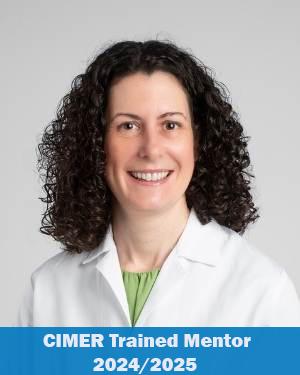Research News
02/24/2021
New NIH Grant Awarded to Study Macrophage Signaling in Lung Injury
Dr. Scheraga will use the support to investigate novel signaling mechanisms that control macrophage function and protect the lung during trauma.

Rachel Scheraga, MD, has been awarded a five-year, $2 million grant from the National Heart, Lung, and Blood Institute, part of the National Institutes of Health (NIH), to study how components of the lung tissue and immune system cooperate to protect the lung from injury after infection.
This new award will build upon Dr. Scheraga's previous research in the lab of Mitchell Olman, MD, which was supported by an earlier funded NIH training grant. The researchers identified that a protein called TRPV4 (transient receptor potential vanilloid 4) helps protect against infection-associated lung injury by regulating the activity of immune cells called macrophages.
"This is my first independent grant, which is a milestone in my career as a physician-scientist," said Dr. Scheraga, who is associate staff in the Department of Inflammation & Immunity and a physician in the Department of Critical Care Medicine. "Our team was the first to show that TRPV4 controls essential macrophage functions. This newest grant provides our team with the opportunity to expand our understanding of the mechanism by which TRPV4 controls immune cell function."
Macrophages envelope and destroy invading pathogens and stimulate the movement of other immune cells towards sites of inflammation and infection, essentially calling for backup. Because they mount the primary active attack against infection, macrophages have become an important focus in the study to find new therapies for treating or preventing lung injury caused by infection.
The long term goal of the study, according to Dr. Scheraga, is to identify new biological targets for treating pneumonia-associated lung injury as bacterial pneumonia takes the lives of between 40,000-70,000 individuals in the U.S. each year and affects over 1.2 million people. Currently, there is no effective pharmacological therapy to protect the lungs against pneumonia-associated injury, although Dr. Scheraga is hopeful that this research to develop a broader understanding of TRPV4-dependent signaling in macrophages will move the field closer to finding an actionable drug target.
Image: Macrophage engulfing bacteria
Featured Experts
News Category
Related News
Research areas
Want To Support Ground-Breaking Research at Cleveland Clinic?
Discover how you can help Cleveland Clinic save lives and continue to lead the transformation of healthcare.
Give to Cleveland Clinic